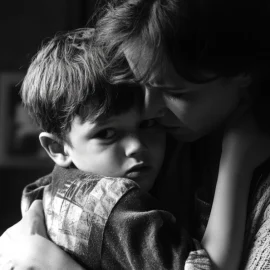
How does patriarchal masculinity affect men’s emotional well-being? How can women help support men to heal emotionally?
bell hooks’s book, The Will to Change, explores the impact of patriarchal masculinity on men’s lives. The book explains how societal expectations shape men’s emotional experiences and relationships.
Read below for a brief The Will to Change book overview.
The Impact of Patriarchal Masculinity on Men’s Lives
In The Will to Change book, bell hooks says that, at an early age, boys are taught to adopt a rigid and commanding version of manhood. Masculinity is frequently associated with the exaltation of solitude and the repression of feelings, except for anger, in a society dominated by patriarchal values. The relentless expectation that men must always remain unemotional impedes their full participation in nurturing their emotional well-being and embracing the entirety of their human experience.
You should support boys in cherishing their unique identities without feeling pressured to conform to conventional masculine standards. Emotionally attuned men often feel alienated because patriarchal norms devalue emotional connections among men.
Men are compelled to stifle their emotions, a practice that exacts a substantial emotional cost. Those who adhere to traditional masculine norms frequently encounter psychological difficulties, such as depression and addiction issues. They grapple with engaging their emotions, a barrier that not only impairs their capacity to experience love but also their capability to convey it.
Men often conceal their unease and concern behind a facade of fury, as it’s the sole sentiment that a male-dominated culture considers permissible for them to express. Frequently, emotionally distancing oneself lays the groundwork for becoming insensitive to one’s feelings, which can pave the way for mental health concerns.
The Myth of Masculinity and Dominance
Patriarchal societal norms frequently associate masculinity with the expectation of exhibiting aggression, dominance, and a predisposition toward violence. From an early age, boys are often instructed to conceal their feelings, except for anger, and to steer clear of actions that might be perceived as typical of the opposite sex.
The issue is exacerbated by the fear that if boys show their emotions, they might be seen as homosexual, which is a concern that homophobia ingrains. Men are indoctrinated with the notion that their inclination towards aggression is a confirmation of their manhood in a patriarchal society.
The prevailing story that associates masculinity with inherent aggression and dominance needs to be contested and deconstructed because it fosters a setting where violence, whether psychological or physical, is used to validate one’s masculinity.
Confronting Emotional Suppression
To embark on a journey towards emotional healing, you need to confront and work through your concealed suffering and embarrassment. To undergo such a profound change, it’s essential to adopt an empathetic mindset, engage in introspective thought, and maintain a readiness to share your feelings openly.
You can begin to comprehend the aspects of your identity that you’ve been conditioned to hide by contemplating moments in your youth when your true feelings were ignored.
Societal norms often discourage men from pursuing emotional healing by seeking solace or addressing their emotional wounds through the support of fellow men. Childhood deficiencies in emotional nurturing can lead to lasting effects, resulting in adults who struggle to form relationships and express their emotions.
Organizations such as Alcoholics Anonymous highlight the necessity of group support and transparency about individual vulnerabilities in the healing process, a concept that diverges sharply from the commonly encouraged isolation by societal standards that are entrenched in patriarchal values.
Restoring Dignity Through Feminist Values
A reimagined understanding of what it means to be a man promotes ideals of equity, empathy, and reciprocal regard, aiming to revolutionize conventional views of masculinity.
Disconnecting From Authentic Selves
You’re driven to disconnect from your authentic self and live in a state of rejection because of the societal expectations imposed by norms of male dominance. From a young age, boys frequently face societal pressures to conform to traditional masculine norms, a shift that typically involves an emotional division marking their initiation into these gender-specific roles.
You’ve been socially programmed to conceal your feelings, which leads to the concealment of your genuine self and the emotional wounds you bear. This results in a semblance of autonomy, but in reality, it causes considerable psychological distress and suppression.
Embracing Feminist Perspectives
Feminist perspectives urge you to reevaluate your concept of masculinity, emphasizing the significance of being emotionally expressive, enhancing social skills, and committing to the pursuit of equal rights for all genders. Adopting these principles enables you to transcend the limitations of conventional masculine norms.
You can heal from the harm inflicted by this system by facing and changing the conventional attitudes associated with the assertion of male superiority. By embracing the capacity for open emotional expression and cultivating intimate connections, you progress towards an understanding of masculinity that is shaped by feminist principles, enabling you to act genuinely and reclaim your capacity for deep love.
Women’s Role in Men’s Transformation
Examining how women contribute to and foster the emotional growth and change in men, particularly in a male-dominated social structure.
Desire for Emotional Openness
Women yearn for the men in their lives to genuinely connect with their feelings and demonstrate true care and attentiveness toward their welfare. As women grow more autonomous and assured through their career successes and express their refusal to be oppressed, there’s an increasing anticipation that men will delve deeper into emotional closeness and improve their ability to show love.
Supporting Men’s Healing Journey
Creating a supportive atmosphere that motivates you to question and scrutinize the deep-seated conventions of a male-dominated culture is essential for your psychological well-being. This method involves women aiding you in expressing your emotions and steering you toward the formation of a self-defined identity, separate from the deceptive guise prescribed by cultural expectations of what it means to be masculine.
Women play a pivotal role in supporting you on your transformative path as you confront past traumas and strive to express your feelings genuinely. Those who challenge patriarchal standards and support you in sharing your emotions are instrumental in your deep healing and transformation.






